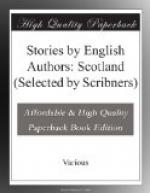Notwithstanding this aristocratic resolution, the great practical question, “How am I to live?” began to thrust itself unpleasantly before me. I am one of that unfortunate class who have neither uncles nor aunts. For me, no yellow liverless individual, with characteristic bamboo and pigtail,—emblems of half a million,—returned to his native shores from Ceylon or remote Penang. For me, no venerable spinster hoarded in the Trongate, permitting herself few luxuries during a long protracted life, save a lass and a lanthorn, a parrot, and the invariable baudrons of antiquity. No such luck was mine. Had all Glasgow perished by some vast epidemic, I should not have found myself one farthing the richer. There would have been no golden balsam for me in the accumulated woes of Tradestown, Shettleston, and Camlachie. The time has been when—according to Washington Irving and other veracious historians—a young man had no sooner got into difficulties than a guardian angel appeared to him in a dream, with the information that at such and such a bridge, or under such and such a tree, he might find, at a slight expenditure of labour, a gallipot secured with bladder, and filled with glittering tomans; or, in the extremity of despair, the youth had only to append himself to a cord, and straightway the other end thereof, forsaking its staple in the roof, would disclose amid the fractured ceiling the glories of a profitable pose. These blessed days have long since gone by—at any rate, no such luck was mine. My guardian angel was either wofully ignorant of metallurgy, or the stores had been surreptitiously ransacked; and as to the other expedient, I frankly confess I should have liked some better security for its result than the precedent of the “Heir of Lynn.”
It is a great consolation, amid all the evils of life, to know that, however bad your circumstances may be, there is always somebody else in nearly the same predicament. My chosen friend and ally, Bob M’Corkindale, was equally hard up with myself, and, if possible, more averse to exertion. Bob was essentially a speculative man—that is, in a philosophical sense. He had once got hold of a stray volume of Adam Smith, and muddled his brains for a whole week over the intricacies of the “Wealth of Nations.” The result was a crude farrago of notions regarding the true nature of money, the soundness of currency, and relative value of capital, with which he nightly favoured an admiring audience at “The Crow”; for Bob was by no means—in the literal acceptation of the word—a dry philosopher. On the contrary, he perfectly appreciated the merits of each distinct distillery, and was understood to be the compiler of a statistical work entitled “A Tour through the Alcoholic Districts of Scotland.” It had very early occurred to me, who knew as much of political economy as of the bagpipes, that a gentleman so well versed in the art of accumulating national wealth must have some remote ideas of applying his principles profitably on a smaller scale. Accordingly I gave M’Corkindale an unlimited invitation to my lodgings; and, like a good hearty fellow as he was, he availed himself every evening of the license; for I had laid in a fourteen-gallon cask of Oban whisky, and the quality of the malt was undeniable.




